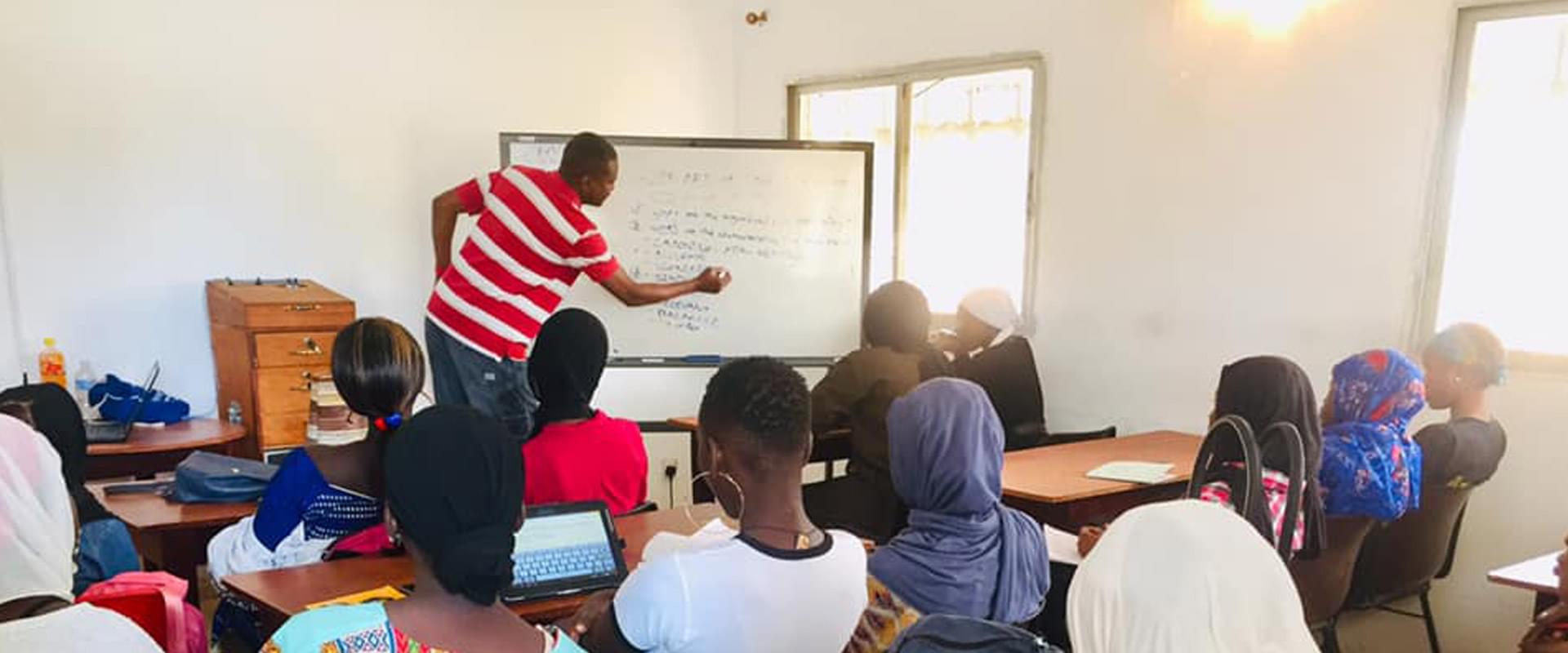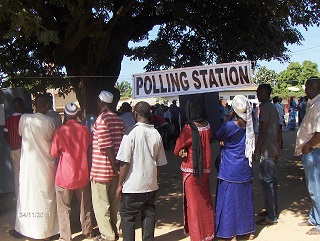
Dec 3, 2021 7:24 PM | Article By: Aji Fatou Jammeh

Gambians vote in National Assembly elections in March 2011 at Bartez, Serekunda (Photo Credit: Modou S. Joof)
In The Gambia, electorates
would queue and only one person is allowed at a time to enter the polling
station to cast his or her vote secretly. This privacy ensures there is no
intimidation or influence from any person when exercising the right to franchise.
But citizens with visually
impaired disability and with voting rights have ever been exempted from
enjoying this same privacy since independence. They have to rely on third
parties to vote on their behalf even though the law says secret ballot for all
voters.
Alpha Secka, a visually
impaired person said such practice is discriminatory. “We are discriminated
[against] everywhere,” he said.
Alpha’s short
response goes to show his frustration about the system and the plight of
persons with visual impairment in the country, in general.
Open to betrayal
During elections, Alpha
like other colleagues of his, have little choice but to accept to be
accompanied by a trusted family member or friend to vote for a candidate of his
choice. While there is trust in that person, Alpha said that he would have no
knowledge whether the person has actually voted as he had authorized.
“I trust my family member
who serves as an escort to help me cast my vote without any two minds. I have
the confidence he would vote where I want him to vote for me. But if he or she
fails to cast my vote where I asked him or her to, it is left between the
person and God,” he said.
Alpha has expressed
dissatisfaction with this arrangement, describing the act as “political
exclusion of visually impaired persons”. According to him, he could not enjoy
his constitutionally guaranteed rights.
The 1997 Constitution of
The Gambia is unambiguous as Section 33 warns against discriminations during
elections, including those living with any forms of disabilities. The Gambia
has also ratified since July 2015 and domesticated the
Convention of the Rights of the Persons with Disabilities as the recently passed Persons with Disability Act
2021. It has also ratified the Optional
Protocol to the Convention the same year.
Mechanisms to respect
privacy
Alpha demands that the
authorities, including the Independent Electoral Commission (IEC), put up
mechanisms that would allow them to choose the candidate they want secretly
without relying on a third party.
“We want a system where
everyone is included in everything,” he said.
The United Nations
Convention on the Rights of Persons with Disabilities (UNCRPD), which
highlighted several barriers to political participation of people with
disabilities, underscores the equal rights of persons with disabilities to
participate in political life.
This situation has also
left Muhammed Krubally, the Chairperson of the Gambia Federation of the
Disabled (GFD) concerned. A Magistrate by profession, visually impaired
himself, Krubally said the right to participate in elections are statutorily
guaranteed by national and international legislations.
However, he is concerned
that the laws protecting them to take part in elections are disregarded in
practice during elections in many ways, leaving their fundamental rights to be
violated.
“If you look at the
position of the ballot boxes, for the blind to independently cast their votes
is always absent,” he said.
“You may sometimes choose
somebody because you trust the person to go with you to the voting room to help
you vote. Who knows [what happens] because you are totally blind? That person
may not cast for the candidate you want to vote for. He may cast it for his or
her candidate of choice.”
These challenges raised
are expected to be discovered by the IEC through consultative meetings with all
stakeholders ahead of elections. But Krubally is disappointed that the IEC
never factored the involvement of his association as part of the larger Civil
Society Organizations in the country to take part in the formation of policies
and programmes.
The GFD chairperson says
the lack of privacy in the voting process is a rights violation because one
could potentially be assisted by a stranger. He expected the IEC to make
available to the blind the Braille ballots or enlarged print, magnifying
material for easy reading.
He also raises concerns
over the lack of trained personnel at polling stations to deal with people with
various disabilities.
IEC’s weak alternative
The electoral body’s communications
officer, Pa Makan Khan, has admitted that the IEC is doing less for the people
with disabilities, including the visually impaired persons in terms of privacy
voting. But insisted that the Commission has given them priority to vote as
they are not asked to join voting queues.
On the issue of voting,
Khan maintained that visually impaired persons can rely on their trusted family
members to vote for the candidates of their choice.
“…they may choose to
come with an escort who may be a family member or a friend who helps them to
cast their votes, and in doing so, those people must not disclose the choice of
candidate of the person with disability because it’s a matter of trust and
confidence and they must not break that trust,” he said.
If
that does not work, Khan’s alternative is that such people can still be guided
by the polling team who have taken an oath of secrecy to accompany
them to the compartment and the person votes for his choice.
Comments (0)
0 Likes
Leave your thought here
Your email address will not be published. Required fields are marked *